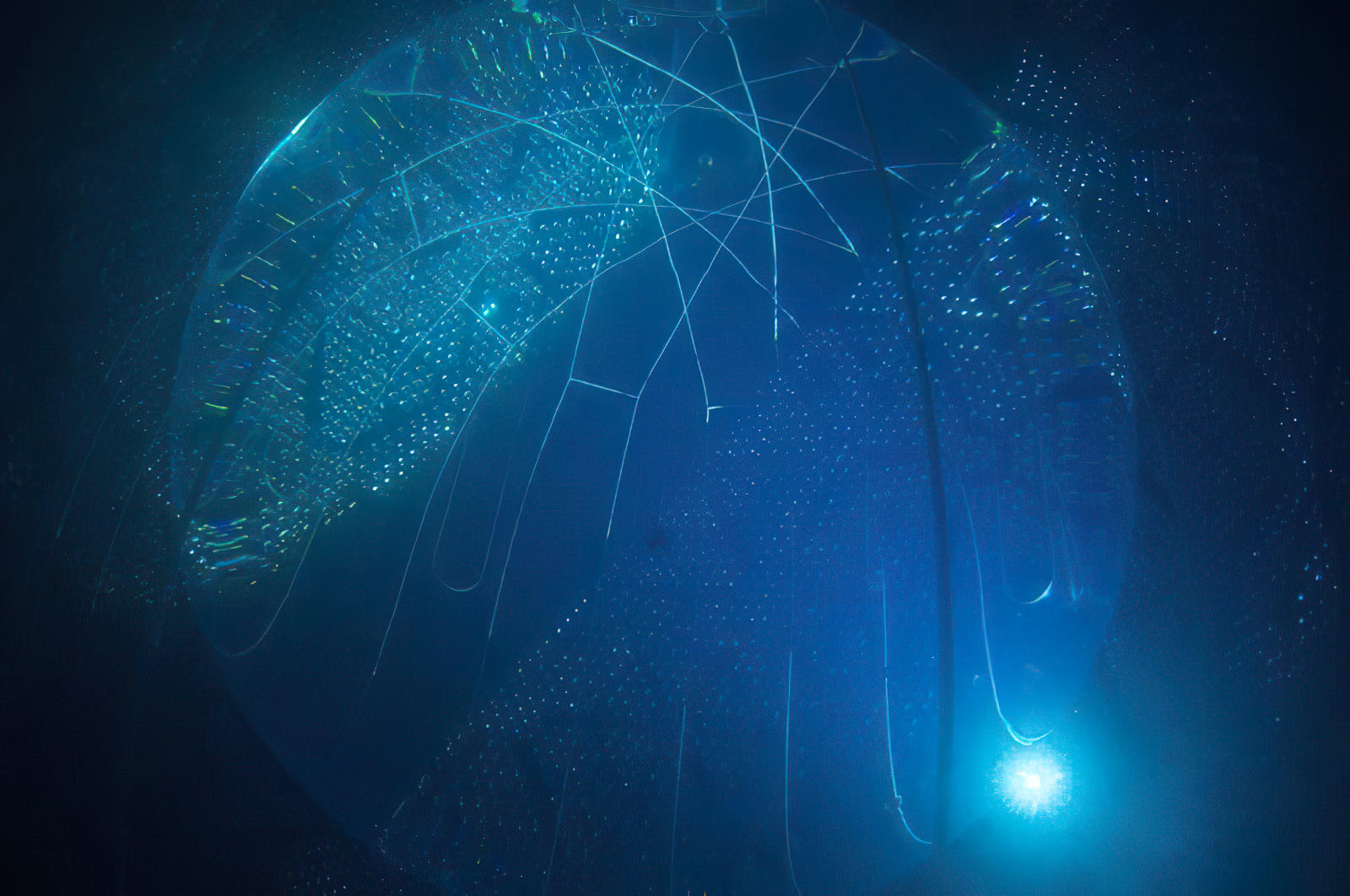
SNO+ detector at a depth of 2 kilometers in a mine in Ontario, Canada. The image shows ropes holding a 12 m diameter acrylic vessel filled with 1,000 tons of water and light sensors that detect tiny amounts of light from neutrino interactions. Credits: Image courtesy of SNO+ collaboration
For the first time, the SNO+ experiment has demonstrated the ability to detect neutrinos emitted by a nuclear reactor at a distance of 240 km using ordinary water.
Science
Neutrinos are subatomic particles that exhibit very weak interactions with matter. They are formed from various types of radioactive decay that occur in the Sun’s core and nuclear reactors. Also, blocking neutrinos is impossible; They can travel effortlessly from the core of a nuclear reactor to remote detection, and even penetrate the Earth.
Therefore, devices of enormous size and high sensitivity are required to capture the tiny signals from neutrinos. The SNO+ experiment demonstrated that a detector filled with just water was capable of detecting nuclear neutrinos.
Impact
The SNO+ measurement shows that remote nuclear reactors can be monitored with something as simple and cheap as water. Nuclear reactors cannot shield the neutrinos they produce. This means that the measurement of SNO+ is proof of concept that such water detectors can play a role in ensuring nonproliferation.
As with SNO+, such detectors must be extremely clean of any radioactivity, large (SNO+ contains 1,000 tons of water) and able to detect the tiny amounts of light produced by neutrinos. However, the use of water means that much larger detectors are possible and a real option to „see” even the most distant reactors.
Summary
Scientists have long thought that the tiny signals (just 10-20 photons) produced by nuclear neutrinos in water detectors would make it impossible to detect those neutrinos, especially since the rate of these signals is so low when the detector is far from the reactor. .
By ensuring that the detector was clean of trace levels of radioactivity and had a lower energy range than any water detector ever built, SNO+ was able to see these signals and show that they came from at least 240 kilometers (150 miles) away from the reactors. ) far away. The measurement was even more difficult due to the background of residual radiation (pseudo-events) and neutrinos created in the atmosphere by cosmic rays, which had to be detected and removed.
Water detectors have many advantages. They are cheap and quite large, making them useful for monitoring reactors across international borders. Improvements to such monitoring, including using water-based liquid scintillators or „loading” water with gadolinium, are being tested by other collaborations.
Reference: „Evidence of Antineutrinos from Remote Reactors Using Pure Water in SNO+” by A. Allega et al. (The SNO+Collaboration), 1 March 2023, DOI: 10.1103/PhysRevLett.130.091801
This work is from the SNO+ Collaboration, an international collaboration of roughly 100 scientists from the United States (the University of Pennsylvania, the University of California at Berkeley and Lawrence Berkeley National Laboratory, the University of California at Davis, Brookhaven National Laboratory, Boston University, and the University of Chicago), Canada, the United Kingdom, Portugal, Germany, China, and Mexico. SNO+ is located in SNOLAB, the Canadian underground laboratory.
SNO+ is funded by the Department of Energy Office of Science, Office of Nuclear Physics and has received funding from the National Science Foundation and the Department of Energy National Nuclear Security Administration through the Nuclear Science and Security program. Funding in Canada comes from Canada Foundation for Innovation, Natural Sciences and Engineering Research Council, Canada Institute for Advanced Research, Queens University, the Ontario Ministry of Research, Innovation and Science, the Alberta Science and Research Investments Program, the Federal Economic Development Initiative for Northern Ontario, and the Ontario Early Researcher Awards. In the United Kingdom, funding has come from the Science and Technology Facilities Council, the European Union’s Seventh Framework Programme under the European Research Council grant agreement, and the Marie Curie grant agreement. Funding has also come from the Fundaçáo para a Ciência e a Tecnologia (FCT-Portugal), the Deutsche Forschungsgemeinschaf in Germany, DGAPA-UNAM and Consejo Nacional de Ciencia y Tecnología in Mexico, and Discipline Construction Fund of Shandong University in China.

